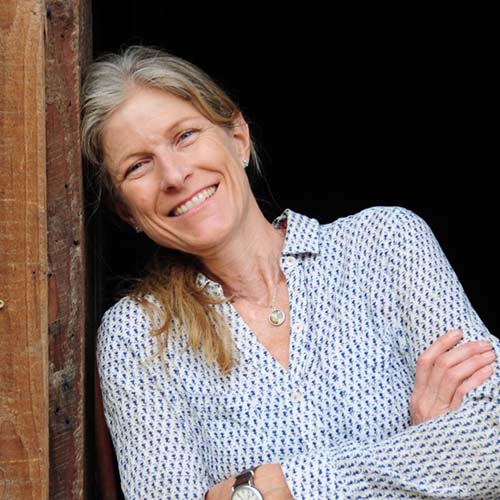Visiting Poets
Lisa Allen Ortiz
Select Poems
The raven lived behind the woodshed,
and for a while the chickens lived there too,
but the raven spooked the hens with his shadow hops,
his devil voice, and they would not lay eggs,
so my dad made them a bigger coop and gave
the raven theirs, and my sister and I
would stand beside the raven coop
and shout: Hello! Hello!
The raven would ignore us, standing on his
perch, mean and mute. If we put our hands
in there, he would bite them, and it hurt.
He loved my dad.
The raven learned to speak:
hello and no and never more
and the sky is falling. Mornings, the raven
would call my dad by name.
He fed the bird meat or kibble, and the raven
would make little kitten sounds and crawl
up my dad’s shoulder and nibble at his
ear and hair, and my dad would walk around
and everybody loved those days,
there were parties then, my dad
with his leather vest, his artist swagger,
guests who came with the wine and bluster,
and the raven on his shoulder cawing: The sky
is falling! The sky is falling!
Everyone walked across the meadow
two by two, flowered dresses, lace shirts, glass plates.
My sister and I climbed into the trees ––
so many things we didn’t know––
and watched from branches, but we knew animals
were all around us in the forest,
and we knew that animals could speak.
We whispered in that tree: hello, sky, falling,
and we waited for something dark with wings
to call our names.
From GUIDE TO THE EXHIBIT (Perugia Press, 2016)
A painted meadowlark on a painted fallen log.
sketch of canyon and field done in ochre strokes.
The snake inside is still as art, convict-striped,
glass-eyed––and real.
Snake, I also was born in the forest and I also danced
on a done-up stage, hair ribbons pressed over my ears.
Back then each animal had is lair. Now the meadows,
the trees area all painted to give us a feel.
Only a fool holds onto place. To survive, make the place
you are look like home. Snake, this is the song of the kept.
See the crack in the painted sky? Soon the herpetologist
will open the back of your world. He’ll reach in and lift you
to twist in the air, coil the length of his arm, your primitive
three-chambered heart will shiver in its three-chambered sac.
This is affection––this tender art they made of you, this use.
The man will study your eyes and skin.
He will measure and weigh. He will note your mood.
Let him study. Let him see.
From GUIDE TO THE EXHIBIT (Perugia Press, 2016)
The bears again,
the coats of them, sheened claws––
a crush of bears down by the creek, and me
eating fish and pawing mud and rocks,
damp and growly, and maybe I was a bear
or maybe I was myself,
but anyway I pushed and dug between
the bears’ slack skin, their swinging heads.
I thought: I’ve missed so much of you. Why do we plan
and mend when we have flesh and hair?
Baby, my longing for you swam in me
as if longing were a force
that lifted the bears and me above the trees
so we grunted and pawed the air,
sparks and embers and bellowing bears
keening through the vast odds of space,
the stars slid down my arms––and from
the dark height I could see you
curled like a wisp in our fog of bed,
the yellow light, tiny steps and trees,
and even from that height, even with
my honey-claws, I could not scoop you up––
not your slumber, not our house,
not the wrap of porch, our daughters
in their bunks, not the moths colliding
with the light. Nor could I whisper
with my inky lips and teeth,
my awkward bear-like tongue,
how much I want to keep––
and I know it’s imperfect to be so close
but up there in the dark
where bears hunt planet fish, where nebulas
spin and distance shifts with time, it’s so beautiful
and so terrifying. Wake up, Baby.
I want to tell you: this is normal. Every night,
a sky with bears made out of stars.
From GUIDE TO THE EXHIBIT (Perugia Press, 2016)

